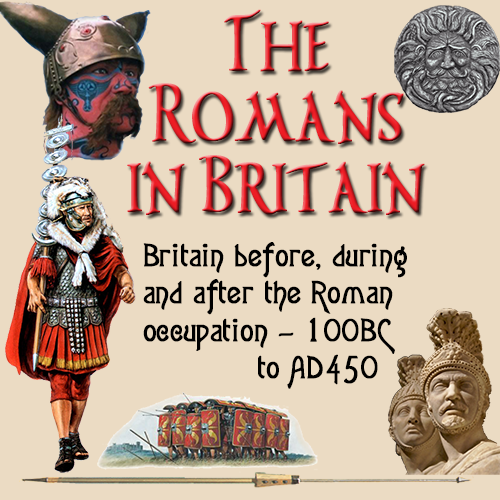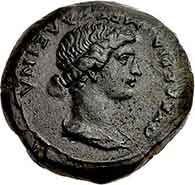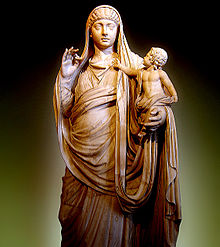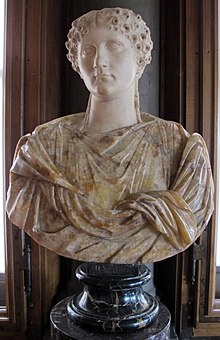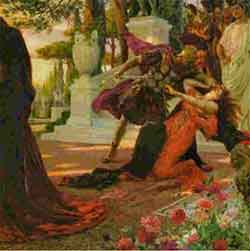Valeria Messalina,
Third wife of
Emperer Claudius
Valeria Messalina (born ca. 17/20 Died 48), sometimes spelled "Messallina," was the third wife of the Emperor Claudius. She was a paternal cousin of the later Emperor Nero, a second cousin of Emperor Caligula, and a great-grandniece of Emperor Augustus.
A capricious, powerful and influential woman with a bad reputation for promiscuity, Messalina allegedly conspired against her husband and was executed on the discovery of the plot. Her very notorious reputation probably resulted from political bias, but works of art and literature have perpetuated it into modern times. After 2000 years, while cannot "separate the wheat from the chaff" — Histories are written by the victors.
Initial Happiness
Little is known about Messalina's life prior to her marriage in 38 to Claudius, her first cousin once removed, who was then about 47 years old. Her ancestry is interwoven heavily amongst the Julio-Claudians and she was even a great-granddaughter of Mark Antony — needless to say, there was quite a bit of inbreeding in her family tree. Two children were born as a result of the union of Messalina and CLaudius: a daughter Claudia Octavia (born 39 or 40), a future empress, stepsister and first wife to the Emperor Nero; and a son, Britannicus born soon after Claudius donned the Purple. When the Emperor Caligula was assasinated in 41, the Praetorian Guard proclaimed Claudius the new emperor and Messalina became Empress.
The Authors of Messalina's History and Actions
After her accession to power, Messalina enters history with a reputation as ruthless, predatory and also, as sexually insatiable, while Claudius is painted as "easily led by her" and "unconscious of her many adulteries" — or as Josh says, "He was a cuck." The historians who relayed such stories, principally Tacitus and Suetonius, wrote some 70 years after the events, in an environment hostile to the Julio-Claudian Imperial Line to which Messalina had belonged. There was also the later Greek account of Cassius Dio who, writing a century and a half after the period described, was dependent on the received accounts of those before him. It has also been observed of his attitude throughout his work that he was "suspicious of women." Neither can Suetonius be regarded as trustworthy. Encyclopaedia Britannica suggests of his fictive approach that he was "free with scandalous gossip," and that "he used 'characteristic anecdote' without exhaustive inquiry into its authenticity." He manipulates the facts to suit his thesis.
First, Tacitus seems to have distinct motives for writing about Messalina that call into question the accuracy of his depiction. As historian Ronald H. Martin notes, Tacitus wrote within a senatorial tradition “that was hostile to Claudius from the outset” because Claudius reduced the power of the Senate. Tacitus himself claimed to be transmitting "what was heard and written by my elders" but without naming sources other than the Also, in Book IV of The Annals, Tacitus reveals that he had consulted the memoirs of Agrippina the Younger, who “recalled for posterity her own life and the fates of her family.” If Agrippina wrote about Messalina in her memoirs, it undoubtedly would have been in a negative light, since Agrippina replaced Messalina as Claudius' wife, and their sons were in competition to be Claudius' heir. Therefore, if Tacitus relied on Agrippina‟s memoirs as a source of information, it surely would have colored his own interpretation of Messalina. Thus, Tacitus‟s sources contribute to his potential inaccuracy and render his depiction less reliable.
Examining Tacitus' narrative style and comparing it to that of the satires of Juvenal, another critic remarks on "how the writers manipulate it in order to skew their audience's perception of Messalina." Indeed, Tacitus seems well aware of the impression he is creating when he admits that his account may seem fictional, if not melodramatic (fabulosus). It has therefore been argued that the chorus of condemnation against Messalina from these writers is largely a result of the political sanctions that followed her death, although some authors have still seen "something of substance beyond mere invention." — Where there is smoke there is fire.
Messalina's Victims
The accusations against Messalina center largely on three areas: her treatment of other members of the imperial family; her treatment of members of the senatorial order; and her unrestrained sexual behaviour. Her husband's family, especially female, seemed to be specially targeted by Messalina. Within the first year of Claudius' reign, his niece Julia Livilla, only recently recalled from banishment upon the death of her brother Caligula, was exiled again on charges of adultery with Seneca the Younger. Claudius ordered her execution soon after, while Seneca was allowed to return seven years later, following the death of Messalina. Another niece, Julia Livia, was attacked for immorality and incest by Messalina in 43 — possibly because she feared Julia's son Rubellius Plautus as a rival claimant to the imperial succession — with the result that Claudius ordered her execution.
It Gets Worse
In the final two years of her life, she also intensified her attacks on her husband's only surviving niece, Agrippina the Younger, and Agrippina's young son Lucius Domitius Ahenobarbus (the later Emperor Nero). The public sympathized with Agrippina, who had twice been exiled and was the only surviving daughter of Germanicus, after Messalina won the execution of Julia Livia. Agrippina was implicated in the alleged crimes of Statilius Taurus, whom it was alleged she directed to partake in "magical and superstitious practices." Taurus committed suicide, and, according to Tacitus, Messalina was only prevented from further persecuting Agrippina because she was distracted by her new lover, Gaius Silius.
A Rival
According to Suetonius, Messalina realized early on that the young Nero could be a potential rival to her own son, Brittanicus, who was three years younger. He repeated a tale that Messalina sent several assassins into Nero's bedchamber to murder him, but they were frightened off by what they thought was a snake slithering out from under his bed. In the Secular Games of 48, Nero won greater applause from the crowd than did Messalina's own son, Britannicus, something which scholars have speculated led Messalina to plot against Nero and his mother once and for all.
Two Final Straws
Two very prominent senators, Appius Silanus and Valerius Asiaticus, also met their death on the instigation of Messalina. The former was married to Messalina's mother Domitia Lepida, but according to Dio and Tacitus, Messalina coveted him for herself. In 42, Messalina and the freedman Narcissus devised an elaborate ruse, whereby they each informed Claudius that they had had identical dreams during the night portending that Silanus would murder Claudius. When Silanus arrived that morning (after being summoned by either Messalina or Narcissus), he confirmed their portent and Claudius had him executed.
Valerius Asiaticus was one of Messalina's final victims. Asiaticus was immensely rich and incurred Messalina's wrath because he owned the "Gardens of Lucullus," which she desired for herself, and because he was the lover of her hated rival Poppaea Sabina the Elder, with whom she was engaged in a fierce rivalry over the affections of the actor Mnester. In 46, she convinced Claudius to order the arrest of Valerius Asiaticus on charges of failing to maintain discipline amongst his soldiers, adultery with Sabina, and for engaging in homosexual acts. Although Claudius hesitated to condemn him to death, he ultimately did so on the recommendation of Messalina's ally, and Claudius' partner in the consulship for that year, Lucius Vitellius. The murder of Asiaticus, without notifying the senate and without trial, caused great outrage amongst the senators, who blamed both Messalina and Claudius. Despite this, Messalina continued to target Poppaea Sabina until she committed suicide.
The same year as the execution of Asiaticus, Messalina ordered the poisoning of Marcus Vinicius — because he refused to sleep with her, according to gossip. About this time she also arranged for the execution of one of Claudius' freedmen secretaries, Polybius. According to Dio, this murder of one of their own turned the other freedmen, previously her close allies, against Messalina for good.
Downfall
In 48 AD, Claudius went to Ostia to visit the new harbor he was constructing and, while there, was informed that Messalina had gone so far as to marry her latest lover, Senator Gaius Silius in Rome. It was only when Messalina held a costly wedding banquet in Claudius' absence that the freedman Narcissus decided to inform him. The exact motivations for Messalina's actions are unknown — it has been interpreted by some, as a move to overthrow Claudius and install Silius as Emperor, with Silius adopting Britannicus and thereby ensuring her son's future accession. Other historians have speculated that Silius convinced Messalina that Claudius' overthrow was inevitable, and her best hopes of survival lay in a union with him. Tacitus stated that Messalina hesitated even as Silius insisted on marriage, but ultimately conceded because "she coveted the name of wife", and because Silius had divorced his own wife the previous year in anticipation of a union with Messalina. Another theory is that Messalina and Silius merely took part in a sham marriage as part of a Bacchic ritual as they were in the midst of celebrating the Vinalia, a festival of the grape harvest.
Tacitus and Dio state that Narcissus convinced Claudius that it was a move to overthrow him and persuaded him to appoint the deputy Praetorian Prefect, Lusius Geta, to the charge of the Guard, because the loyalty of the senior Prefect Rufrius Crispinus was in doubt. Claudius rushed back to Rome, where he was met by Messalina on the road with their children. The leading Vestal Virgin, Vibidia, came to entreat Claudius not to rush to condemn Messalina.
He then visited the house of Silius, where he found a great many heirlooms of his Claudii and Drusii forebears, taken from his house and gifted to Silius by Messalina. When Messalina attempted to gain access to her husband in the palace, she was repulsed by Narcissus and shouted down with a list of her various offences compiled by the freedman.
Despite the mounting evidence against her, Claudius's feelings were softening and he asked to see her in the morning for a private interview. Narcissus, pretending to act on Claudius' instructions, ordered a courier sent to Messalina with orders that she commit suicide; however, when this failed, the messenger, himself, stabbed her. Tacitus said of the suicide:
“…she understood her fate and put her hand to the dagger. In her terror she was applying it ineffectually to her throat and breast, when a blow from the tribune drove it through her.”
After hearing of his wife’s death, Claudius would display no emotion, “no sign of hatred or joy or anger or sadness.” The Emperor did not react and simply asked for another chalice of wine. The Roman Senate then ordered a damnatio memoriae so that Messalina's name would be removed from all public and private places and all statues of her would be taken down.

